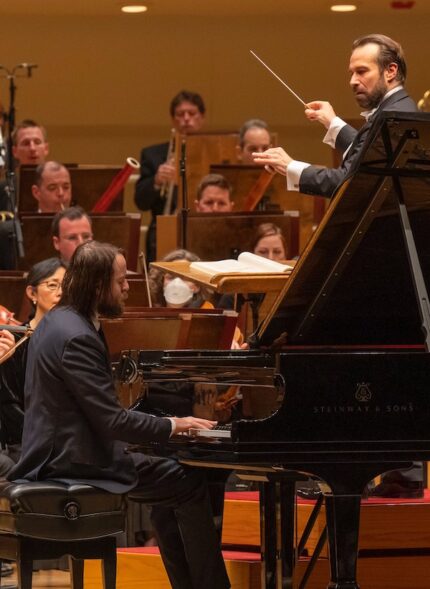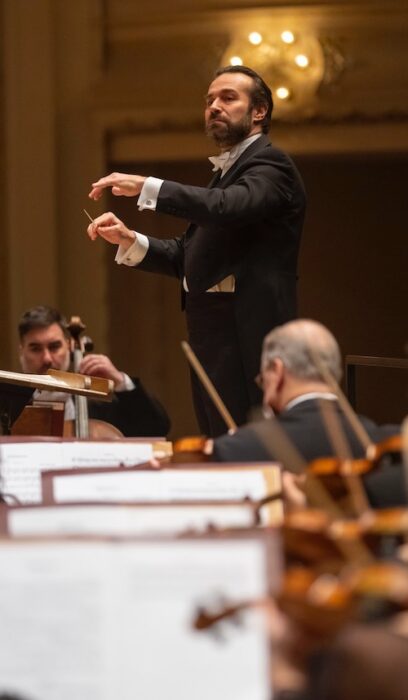A Rachmaninoff night to remember with Trifonov and CSO

We’re supposed to be too jaded in the 21st century to take Sergei Rachmaninoff’s music seriously. Never mind that so many aficionados first came to classical music through the Russian composer’s late romantic concertos and symphonies. Too many notes, too much lushness and Russian gloom, and too bourgeois and enjoyable for our humorless, relentlessly politicized era.
Come on, man. The fact that Rachmaninoff wrote some of the most glorious melodies of all time shouldn’t obscure—much less negate—the extraordinary craft of his music, his ability to create and sustain a large canvas, his brilliant orchestral scoring, and his remarkable (and intensely challenging) piano writing.
To mark Rachmaninoff’s 150th anniversary season, we’ve already had the Rhapsody on a Theme of Paganini from Beatrice Rana in February and solo piano works from Evgeny Kissin just this past week. But whatever else is in store this year, nothing is likely to top Daniil Trifonov’s thrilling performance of Rachmaninoff’s Piano Concerto No. 3 with the Chicago Symphony Orchestra and conductor Fabien Gabel Thursday night.
The bearded, long-haired Russian, looking like something of a holy prophet, may well be the finest pianist in the business today. Yet one of the greatest qualities of Trifonov’s first-class solo performance is that it served to confirm once again what a supreme musical work the mighty Third Concerto is in its own right.
The most gifted musicians are always the most difficult to write about because their artistry seems so natural and innate that they don’t seem to be performing at all. Trifonov did nothing outré or even particularly individual interpretively Thursday night. Yet just by deploying his astounding technical arsenal fully at the service of the music, the fresh and invigorating results made one appreciate this often-played score all the more.
Trifonov gave the big lyrical themes their due without any lingering or undue emphasis, seeming to take a page from the composer’s almost deadpan recordings of his own music. This was virile Rachmaninoff, wholly without sentimentality but neither was it ever cold or inexpressive.
If the pianist’s complete technique made this massive 45-minute work seem less arduous a challenge than usual, there was no lack of engagement and Trifonov’s breakout virtuosity was exhilarating in its power, speed and clarity. (Just 48 hours earlier his Prokofiev at Carnegie Hall with the National Symphony Orchestra was, apparently, just as stellar.)
He played the longer, more difficult cadenza in the first movement—no surprise, but one was struck by how he made it the peak of that movement and seem essential to the scheme of the entire work—not just an opportunity for showy solo brilliance but “the point” (as Rachmaninoff said) that is integral to the concerto’s musical logic.
He assayed the inward lyricism of the central Intermezzo with a lean expressive poise and brought a light, tripping touch to the scherzando section. The soloist’s inexorable momentum in the finale, the lyrical theme emerging in radiant resplendence, and the final octave runs up the keyboard to the blazing coda were as well-played and edge-of-the-seat exhilarating as one is ever likely to experience.
In his accompaniment with the orchestra, Gabel provided a genuine partnership with his famous soloist. Not only was coordination airtight throughout, but the responsive, firmly pointed orchestral playing sealed the performance.
Clamorous ovations brought Trifonov and Gabel back out repeatedly until, after a solo bow, the pianist moved over to the bench for an encore. After all the thunder and bravura, Trifonov took the surging adrenaline down in the room with Myra Hess’s transcription of Bach’s Jesu, Joy of Man’s Desiring—played at a very spacious tempo but rendered with a gentle innocence and purity of expression that seemed an ideal way to end the evening.
Most of the audience was there for Trifonov’s Rachmaninoff, but the performance of Stravinsky’s Petrushka on the first half was equally noteworthy.

Some conductors are intimidated and become over-solicitous at their first CSO appearance. Yet in this all-Russian program, Gabel was relaxed, confident and fully in command from the jump Thursday night in an impressive local debut.
Premiered in 1911, Petrushka is the middle work of Stravinsky’s three ballets written for Sergei Diaghilev’s Ballets Russes (framed by The Firebird and The Rite of Spring).
The French conductor directed a boldly projected performance (in the composer’s less opulent 1946 revision) with committed playing across all sections that made the tale of the doomed title puppet spring vividly to life.
The Shrovetide Fair came across with pungent atmosphere in all its brassy, trashy dinginess. Gabel’s incisive direction consistently brought out the drama and Stravinsky’s kaleidoscopic scoring and harmonic audacity. Everything registered with maximum impact: Petrushka’s desperate alienation and hopeless love for the Ballerina—good piano work from John Wilson on a problematic instrument—the malign brutishness of the Moor, the return to the fairgrounds and the final scene, chase and Petrushka’s death.
Especially notable among spotlight passages were Stefán Ragnar Höskuldsson’s flute solos and the extraordinary playing of principal trumpet Esteban Batallán. A brief lapse in the post-mortal Petrushka’s final nose-thumbing apart, Batallán’s gleaming, acrobatic rendering of the stratospheric trumpet writing was a tour de force.
Gabel cleverly led off the evening with music of Anatoly Liadov. The indolent composer is most famous for music he never wrote, famously squandering the commission of The Firebird due to his procrastination—the job then went to Stravinsky and his score made the composer an international success.
Liadov was essentially a miniaturist but not without talent as shown by his Kikimora. Gabel led an iridescent reading that brought out the Russian folk atmosphere of this seven-minute idyll—underlining the piquant scoring, as with the English horn and pointillist celesta. Some passages almost seem like pre-echos of Stravinsky’s Firebird, which came two years later, making one wonder if Liadov’s delicate hues influenced Stravinsky’s music for his ballet.
The program will be repeated 7:30 p.m. Friday at Wheaton College, and 8 p.m. Saturday and 3 p.m. Sunday at Symphony Center. cso.org
Posted in Performances



Posted Apr 22, 2023 at 11:03 pm by Henry Criz
Had to attend Saturday instead of Thursday – and agree with every word. Saturday was apparently as fresh and enjoyable as Thursday.
Posted Apr 23, 2023 at 7:14 pm by Jeff R
Ditto for Sunday. A CSO performance highlight so far this year.
Posted Apr 23, 2023 at 10:32 pm by John
I have to disagree about Gabel. Routine and uninspired directing all around.
Posted Apr 25, 2023 at 11:55 am by Douglas Paige
As always, an extremely well-written review. Thank you very much, Lawrence!
I attended the Sunday afternoon performance, and it was one of my very favorite piano concerto performances at Orchestra Hall, ever. The entire concert was fantastic. Esteban played flawlessly on Sunday, too!
Cheers!
Doug
Posted Apr 28, 2023 at 9:18 am by Randy Wilson
I thoroughly enjoyed this concert. The Liadov was new to me and I’m grateful they played it. The Igor was as vibrant as I’ve ever heard it played and I’m so glad we heard the full ballet and not the suite. I wasn’t exactly sure what the soloist was trying to do all the time in the Rach but this review helped me understand a little better (and I was unaware there was an alternate cadenza; I thought Trifonov was playing his own).
I brought a friend to this concert who described it as magical, had a million technical questions, and wants to go again. It’s easy for us jaded attendees to take for granted the wonders we experience every week in that hall.